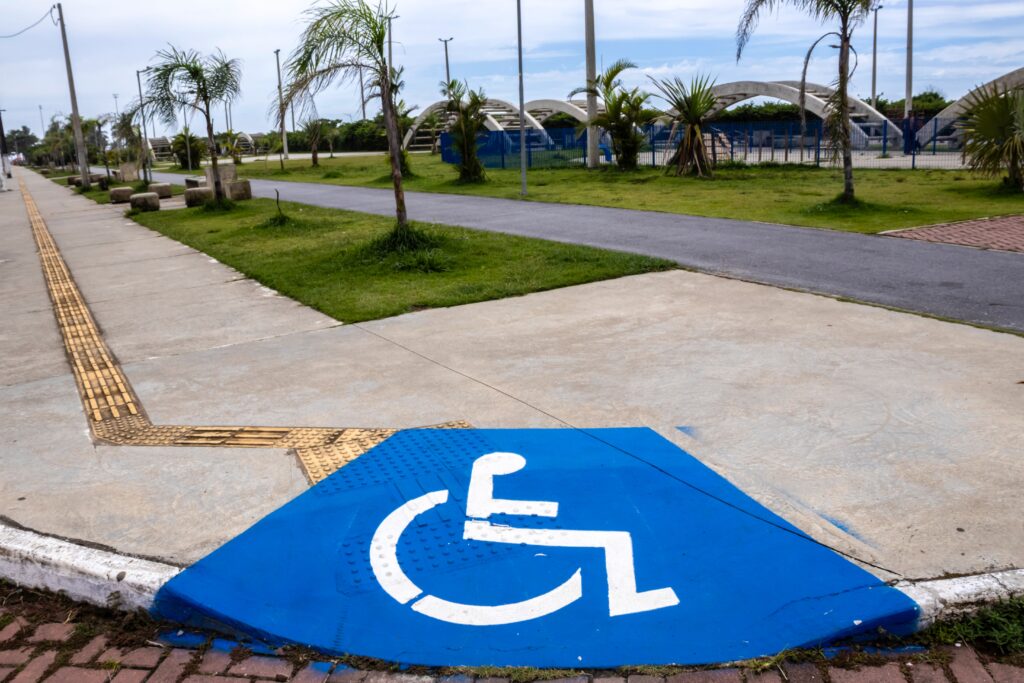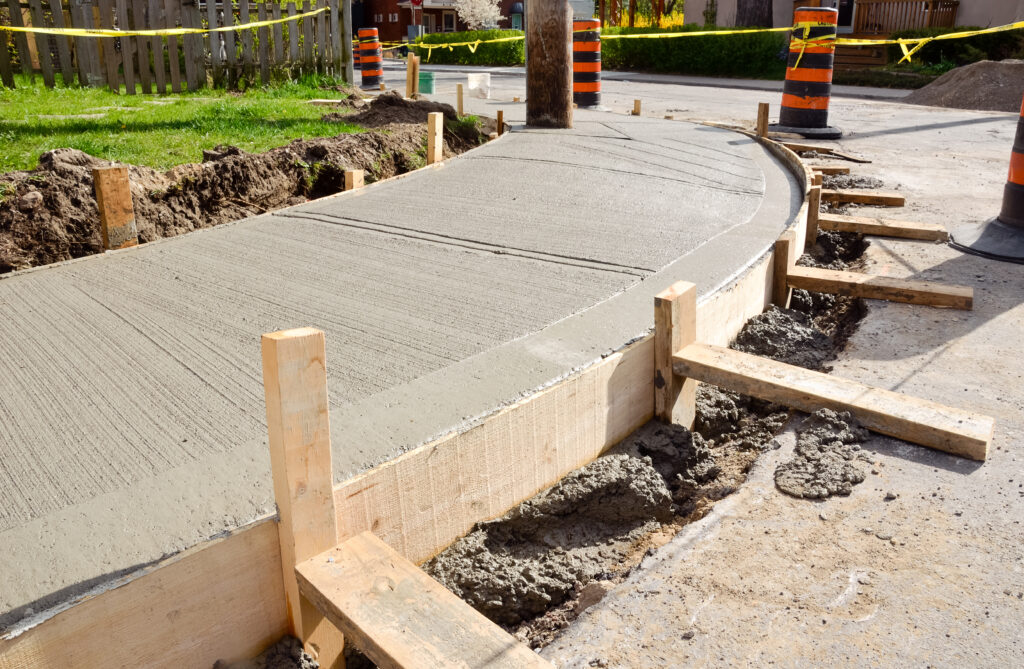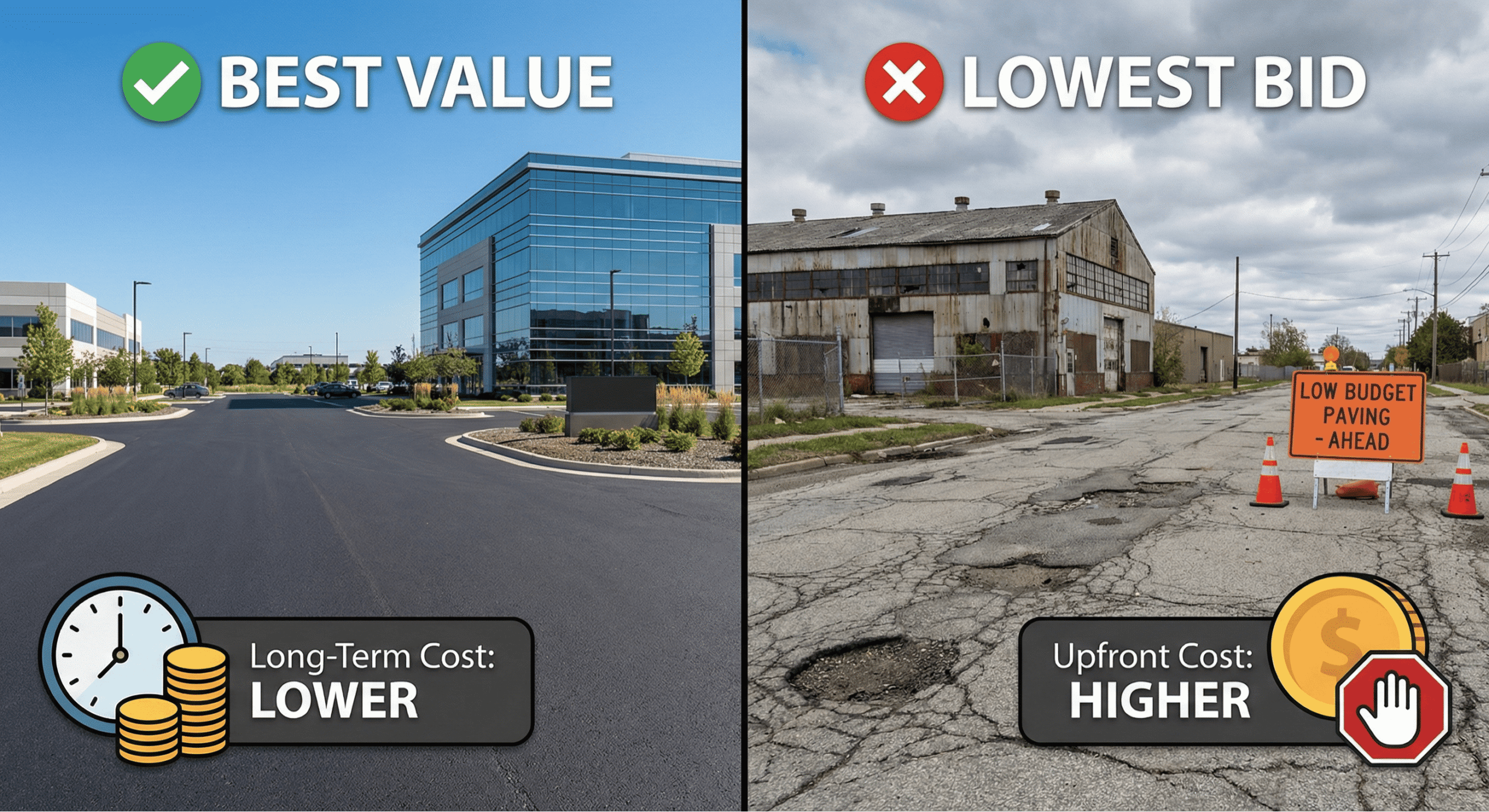
Concrete sidewalks in commercial streets offer lasting advantages that extend far beyond their appearance. They provide durability, safety, and value, all while enhancing the character of busy corridors and supporting the flow of daily business activity.
According to Denver’s plans, approximately 40% of Denver’s sidewalk network is currently either missing or too narrow, underscoring the need for durable, high-quality sidewalk construction in Denver’s commercial streets.
At Asphalt Coatings Company, we witness firsthand how properly installed concrete sidewalks not only withstand Denver’s harsh weather but also create an inviting, professional appearance that supports businesses and enhances property appeal. By combining strength with style, these sidewalks become an essential investment that benefits property owners, customers, and the community for decades.
The Commercial Sidewalk Landscape in Denver
When it comes to Denver’s bustling commercial streets, sidewalks must handle heavy foot traffic, weather swings, and regulations. A well-installed concrete sidewalk provides strength, safety, and appeal. For property managers, they are more than infrastructure; they reflect upkeep, safety, and community commitment. In fact, the Urban Street Design Guide emphasizes that well-designed sidewalks don’t just serve pedestrians — they also strengthen the economic vitality of commercial corridors and improve neighborhood quality of life
Why Sidewalks Matter in a City Setting
Sidewalks are not just walkways; they create first impressions, guide traffic flow, and provide accessibility for everyone. For Denver businesses, the quality of a sidewalk can directly influence how inviting a property feels to customers. A clean, well-maintained surface signals professionalism and care, while cracked or uneven paths may discourage visitors before they even reach the door. According to walkability research, the presence, continuity, and condition of sidewalks are among the strongest predictors of pedestrian activity and urban vitality
Challenges Facing Denver’s Commercial Sidewalks
Denver’s freeze-thaw cycles, exposure to de-icing salts, and intense sun bring unique challenges. In fact, freeze–thaw damage is among the most severe threats to the long-term performance of concrete pavements, especially when paired with de-icing salts that accelerate deterioration.
Asphalt, being more porous and containing bitumen binder, is especially vulnerable to deformation, cracking, and accelerated deterioration under such thermal and chemical stresses.
In busy commercial areas, high pedestrian traffic intensifies these stresses, making durability even more crucial.
Asphalt vs. Concrete for Denver Properties
Although asphalt may be less expensive initially, it typically requires more frequent repairs. Concrete delivers greater longevity and stability, reducing long-term maintenance concerns for property managers. In life-cycle cost studies, concrete pavements show significantly lower maintenance and user costs over time compared to asphalt.
Its ability to hold its shape, resist fading, and maintain an even surface gives it an edge when both appearance and performance matter.
Why is concrete preferred for commercial sidewalks in Denver?
Concrete handles Denver’s climate better, lasts longer than asphalt, and provides a safer, more polished appearance for commercial areas.
Durability and Long Lifespan in Harsh Conditions
Denver’s climate tests every surface, but concrete sidewalks most reliable solution for commercial properties. Unlike other materials, concrete adapts well to both daily wear and the city’s seasonal extremes, giving business owners confidence in its ability to perform over time.
For instance, comparing concrete vs asphalt service life, concrete pavements have an average service life of 27.5 years before repair, compared to just 15.5 years for asphalt. Meanwhile, newer concrete designs are anticipated to last 60 years or more with minimal maintenance.
How Concrete Resists Wear and Weather
Concrete’s dense composition enables it to withstand daily wear, heavy loads, and fluctuating weather conditions. Properly mixed and reinforced, it provides a stable surface that endures year after year. In addition, its resistance to UV rays and chemical exposure helps it withstand even the stress of de-icing salts and strong sunlight.
Reducing Crack Risk with Proper Design
The strategic use of expansion joints, reinforcement, and high-quality mix designs helps minimize cracking. These steps ensure sidewalks stay smooth and functional even through seasonal shifts. Professional contractors also consider soil conditions and drainage patterns to keep sidewalks performing well for decades.
Concrete’s Longevity Compared to Asphalt
Where asphalt sidewalks need resurfacing within a decade, concrete lasts several decades with only minor maintenance. This extended lifespan makes concrete a practical choice for long-term planning, especially in Denver’s high-traffic commercial zones. Many property owners see savings not only in reduced repairs but also in fewer disruptions to business activity.
How long can a concrete sidewalk last in Denver?
With proper installation and care, concrete sidewalks in Denver can last 30 years or more, and in some cases even longer when maintained consistently.
Lower Maintenance and Lifecycle Costs
A wise investment today can prevent expensive repairs tomorrow, and concrete sidewalks demonstrate that principle clearly. By choosing concrete, businesses gain peace of mind knowing that their property will require fewer disruptions, less frequent attention, and lower long-term spending.
A comprehensive pavement life-cycle study found that while concrete has a higher upfront cost, its maintenance and user costs over its lifespan are significantly lower than those of asphalt.
- Routine Maintenance Needs: Concrete requires little upkeep, and that simplicity is a significant advantage. Occasional cleaning, sealing, and small crack repairs are usually all that’s needed. Protective coatings help maintain the appearance while guarding against weather and salts, and when combined with regular inspections, sidewalks stay in reliable condition with minimal effort. The Sidewalk Pavement Life-Cycle Cost Comparison report confirms that concrete and interlocking concrete paver systems tend to have substantially lower cumulative maintenance needs over time.
- Cost Comparison Over Time: Although the upfront cost is higher than that of asphalt, the savings become evident over time. With fewer repairs and replacements, businesses can avoid frequent resurfacing and minimize disruptions, making concrete a far more cost-effective option in the long run.
- The Role of Proper Installation: A well-prepared site, professional finishing, and proper curing all work together to prevent future problems. When experienced contractors handle the job, sidewalks last longer, look better, and demand less maintenance, which provides property managers with lasting peace of mind.
Are concrete sidewalks cheaper in the long run?
Yes, the durability, resilience, and minimal upkeep of concrete make it less costly over its full service life compared to other sidewalk materials.
Safety, Accessibility, and Liability Reduction
For businesses, a sidewalk is more than a pathway; it is a responsibility that reflects care for both customers and the community. A safe, accessible walkway fosters customer confidence, reduces accidents, and enhances the professional appearance of a commercial property.
Slip Resistance and Surface Finishes
Concrete can be finished with broom textures, exposed aggregate, or other surface treatments to improve traction. These details are especially beneficial during Denver’s snowy or wet months when icy conditions make walking treacherous.
Technical guidance from the Interlocking Concrete Pavement Institute highlights that properly textured concrete surfaces provide enhanced slip resistance, helping reduce slip events on pedestrian pathways.
ADA Compliance Features
From smooth ramps to tactile surfaces, concrete sidewalks can be designed to meet ADA requirements, ensuring accessibility for everyone. The ADA standards require that walking surfaces be “stable, firm, and slip-resistant,” which aligns naturally with the use of textured concrete finishes.
Well-planned layouts with gentle slopes and clear pathways make it easier for people with mobility devices, strollers, or vision impairments to move safely and comfortably.
Reducing Trip Hazards and Liability
A stable, even surface decreases the risk of falls and helps businesses avoid costly liability issues. When sidewalks are properly maintained, they prevent common hazards such as uneven joints, loose pavers, or surface deterioration.
The Slips, Trips, and Falls Prevention Guide notes that, under ADA standards, vertical changes of just ¼ inch or more at cracks or joints are considered trip hazards, highlighting the critical importance of consistent maintenance in reducing risk. Fewer accidents mean fewer liability concerns and greater peace of mind for property managers and business owners.
Can concrete sidewalks help reduce liability risks?
Yes, properly installed and well-maintained concrete sidewalks significantly lower the risk of trips and slips, which can help minimize liability exposure and demonstrate a business’s commitment to public safety.
Aesthetic and Branding Advantages

Concrete sidewalks go beyond their functional purpose; they also enhance a property’s appearance and showcase a business’s identity. When designed with care, they become an extension of a company’s brand and a welcoming feature for customers.
Decorative Options for Sidewalks
Stamped, colored, or scored concrete allows businesses to align sidewalks with architectural themes or branding. These finishes not only enhance the property’s visual appeal but also create a distinct and memorable look.
The American Concrete Institute’s Guide to Decorative Concrete reinforces this, consolidating best practices for stamped, colored, and textured finishes that ensure sidewalks are both durable and visually distinctive in public walkways.
Enhancing Curb Appeal
Attractive sidewalks make a strong first impression and encourage more foot traffic into businesses. A polished exterior signals professionalism, quality, and attention to detail, which can set one property apart from its neighbors.
Integrating Design Features
From custom logos and embedded lighting to landscaped borders, concrete sidewalks provide opportunities to showcase creativity. These features enhance both functionality and aesthetics, creating an environment that feels inviting and well-designed.
Can concrete sidewalks be customized for aesthetics?
Absolutely. Concrete offers a wide variety of decorative finishes and colors that make sidewalks visually appealing, brand-friendly, and unique to each property.
Environmental and Sustainability Benefits
Beyond appearance and function, concrete sidewalks contribute to greener practices in urban planning.
- Concrete’s lighter color reduces heat absorption, helping lower urban heat island effects.
- Jointed or permeable designs can improve drainage and stormwater management.
- Locally sourced materials reduce transport emissions and support sustainable construction.
The U.S. EPA notes that “cool pavements” designed to reflect more solar energy can stay 10–16 °F cooler than traditional asphalt, lowering local surface and air temperatures.
Are concrete sidewalks environmentally friendly?
Yes, concrete’s energy efficiency, recyclability, and stormwater management features make it a sustainable choice.
Site-Specific Considerations for Denver
Every city poses unique challenges, and Denver’s sidewalks require careful planning to ensure they last. The city’s climate, soil composition, and building regulations make it essential for property owners to choose installation methods tailored to local conditions. Attention to these factors ensures that sidewalks not only survive but also continue to serve businesses and the community effectively.
Coping with Freeze-Thaw Cycles
Denver’s winters bring frequent freeze-thaw cycles that can cause concrete to expand and contract. Without proper planning, this leads to cracks and premature deterioration. The use of quality sealants, air-entrained concrete, and expert installation techniques helps minimize damage and maintain durability through multiple seasons.
Addressing Soil and Subgrade Issues
Strong foundations and proper site preparation are crucial in preventing settlement and cracks in sidewalks. Denver’s diverse soil types require careful testing, grading, and compaction to ensure a stable foundation. Reinforcement strategies, such as geotextiles or additional sub-base material, provide further protection against shifting soil.
Drainage and Water Management
Sloped designs and well-planned drainage keep sidewalks safe and functional during rain or snowmelt. Inadequate drainage not only shortens the life of concrete but also creates hazards for pedestrians. Proper grading, integration of drainage systems, and effective water diversion strategies are crucial to achieving long-term performance.
Navigating Local Regulations
Denver has strict codes for sidewalk construction, covering everything from dimensions to accessibility standards. Experienced contractors are well-versed in these requirements and efficiently handle permits, inspections, and compliance. This not only avoids costly delays but also ensures sidewalks meet city expectations for safety and accessibility.
Do concrete sidewalks in Denver require special installation methods?
Yes, Denver’s climate and soil demand professional installation techniques, advanced materials, and careful planning to ensure lasting performance and compliance with local standards.
Best Practices for Installation and Quality Assurance
Getting the installation right the first time ensures maximum value from a concrete sidewalk. By following tested practices and paying attention to details, businesses can achieve sidewalks that remain reliable, attractive, and safe for decades.
Planning and Site Preparation
Thorough site preparation prevents costly problems later. Proper grading, soil testing, and compaction create a solid foundation. Removing debris and addressing drainage concerns before pouring concrete ensures stability and reduces the risk of premature damage.
These steps align with geotechnical best practices from the FHWA, which emphasize the importance of subgrade evaluation, moisture control, and drainage in achieving long-lasting pavement performance.
Mix Design and Reinforcement
Choosing the correct concrete mix and reinforcement methods is crucial. High-quality aggregates, well-balanced water-to-cement ratios, and additives tailored for Denver’s climate enhance both the strength and flexibility of the concrete. Reinforcing steel or fiber mesh further enhances the slab’s resistance to cracking and distributes loads evenly.
In Fact, geotechnical guidance from the FHWA recommends freeze-thaw-resistant, air-entrained mixes, which significantly improve durability and scaling resistance over time.
Finishing and Curing Methods
Concrete reaches its full potential only when finished and cured with care. Skilled finishing creates a smooth, attractive surface while maintaining slip resistance. Proper curing—through moisture retention, sealing, or protective coverings—not only protects the slab’s strength but also reduces shrinkage and increases long-term durability.
The FHWA’s curing guidance reinforces this point, detailing how timing and methods such as membrane-forming curing compounds help limit cracking and improve long-term performance.
Inspections and Warranty Coverage
Ongoing inspections after installation catch small issues before they grow into larger problems. Reputable contractors also provide warranties, giving property managers peace of mind that their investment is protected.
These safeguards reflect a contractor’s confidence in workmanship and help keep sidewalks performing at their best. Industry asset-management research reinforces this approach, showing that regular inspections extend service life and reduce overall lifecycle costs.
What should businesses look for in a concrete contractor?
They should look for proven experience, strong references, knowledge of Denver’s codes and climate conditions, and a documented track record of successful sidewalk installations backed by warranty support.
The Value of Investing in Denver’s Sidewalks
At Asphalt Coatings Company, concrete sidewalks are more than just another construction feature. They represent an investment in safety, appearance, and long-term savings that pays off year after year. On Denver’s commercial streets, well-built sidewalks stand firm against harsh weather, improve curb appeal, and reduce liability risks for property owners. When businesses choose us, they gain a partner committed to quality, compliance with city standards, and craftsmanship that lasts for decades.
If your property is ready for an upgrade, let Asphalt Coatings Company deliver sidewalks that showcase durability and style. Reach out to our team today to schedule a consultation and take the first step toward enhancing your business with concrete sidewalks built to perform and impress.
Frequently Asked Questions
How much does it cost to install a concrete sidewalk in Denver?
The cost varies based on size, design, and site conditions, but it is often more economical in the long term compared to asphalt.
Can decorative concrete handle Denver’s climate?
Yes, decorative finishes are applied to the same durable concrete base, making them just as resistant to local weather conditions.
What maintenance should I schedule for concrete sidewalks?
Simple cleaning, occasional sealing, and quick crack repair are usually enough to keep sidewalks in top condition.
How does concrete support ADA compliance better than other materials?
Concrete’s smooth finish and adaptability for ramps and tactile elements make it easier to design ADA-compliant sidewalks.
Why choose Asphalt Coatings Company for sidewalk installation?
With extensive experience in Denver’s commercial properties, the company delivers professional installation, attention to detail, and long-term value.



